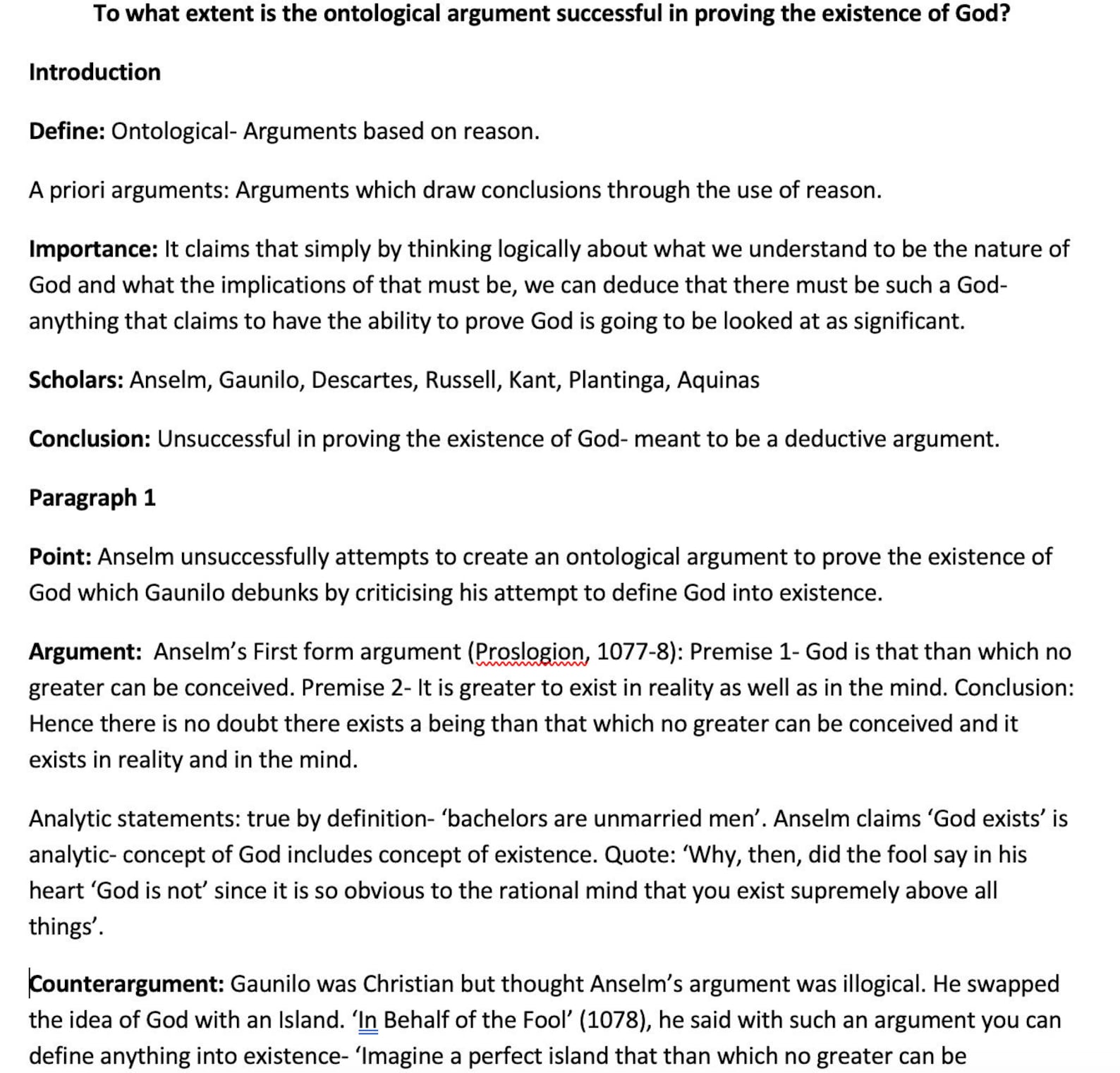
Related categories
· In this paper I will argue that Anselm’s ontological argument for the existence of God is indeed adequate for establishing the necessary existence of the Greatest Conceivable Being. In order to accomplish this, I will argue that Anselm’s premises are sound, and that his conclusion rightfully follows his premises The principle of the Ontological Argument regards this as being as an attribute. The Ontological argument can only succeed using faith in something which cannot be quantified, therefore can only really be used to prove the existence of God by someone who is already a believer, as Barth suggests “it can tell what theists believe about God but not whether he The ontological argument is a group of different philosophers arguments for the existence of God. “Ontological” literally means talking about being and so in this case, that being is the existence or being of God. The main component of the Ontological argument can be found in the Anselm’s “Proslogion” which is a short work that tries to demonstrate

“It is impossible to argue for the existence of God from his attributes”. Discuss
That is to say that, according to Kant, the ontological argument can be understood to be stating that “if God exists, he must necessarily exist” but that this is essentially a tautology and cannot provide an understanding of God outside of our own idea of him Anselm’s ontological argument for the existence of God corners around the definition of God as “a being than which nothing greater can be conceived” as well as two modes of existence, “in the understanding” and “in reality” (Anselm Chapter 2). His argument is as follows: 1) God is a being than which nothing greater The ontological argument for God’s existence is a work of art resulting from philosophical argumentation. An ontological argument for the existence of God is one that attempts the method of a priori proof, which utilizes intuition and reason alone. The term a priori refers to deductive reasoning. Don’t waste time Get Your Custom Essay on
Academic Tools
That is to say that, according to Kant, the ontological argument can be understood to be stating that “if God exists, he must necessarily exist” but that this is essentially a tautology and cannot provide an understanding of God outside of our own idea of him The ontological argument, then, is unique among such arguments in that it purports to establish the real (as opposed to abstract) existence of some entity. Indeed, if the ontological arguments succeed, it is as much a contradiction to suppose that God doesn’t exist as it is to suppose that there are square circles or female bachelors The ontological argument for God’s existence is a work of art resulting from philosophical argumentation. An ontological argument for the existence of God is one that attempts the method of a priori proof, which utilizes intuition and reason alone. The term a priori refers to deductive reasoning. Don’t waste time Get Your Custom Essay on
Essay Examples
Anselm’s ontological argument for the existence of God corners around the definition of God as “a being than which nothing greater can be conceived” as well as two modes of existence, “in the understanding” and “in reality” (Anselm Chapter 2). His argument is as follows: 1) God is a being than which nothing greater The principle of the Ontological Argument regards this as being as an attribute. The Ontological argument can only succeed using faith in something which cannot be quantified, therefore can only really be used to prove the existence of God by someone who is already a believer, as Barth suggests “it can tell what theists believe about God but not whether he · This type of argument, an ‘ontological argument’ is a priori, and deductive. Medieval Platonic Monk Anselm produced one, which tries to show that God is ‘de dicto necessary’ (i.e. necessary through language). It begins with Anselm, who argues (in his ‘Prosologion’) that God is ‘that – thus – which – nothing – greater – can – be – conceived’.Estimated Reading Time: 8 mins

The Argument For The Ontological Argument
The ontological argument is a group of different philosophers arguments for the existence of God. “Ontological” literally means talking about being and so in this case, that being is the existence or being of God. The main component of the Ontological argument can be found in the Anselm’s “Proslogion” which is a short work that tries to demonstrate The ontological argument, then, is unique among such arguments in that it purports to establish the real (as opposed to abstract) existence of some entity. Indeed, if the ontological arguments succeed, it is as much a contradiction to suppose that God doesn’t exist as it is to suppose that there are square circles or female bachelors · This type of argument, an ‘ontological argument’ is a priori, and deductive. Medieval Platonic Monk Anselm produced one, which tries to show that God is ‘de dicto necessary’ (i.e. necessary through language). It begins with Anselm, who argues (in his ‘Prosologion’) that God is ‘that – thus – which – nothing – greater – can – be – conceived’.Estimated Reading Time: 8 mins
No comments:
Post a Comment